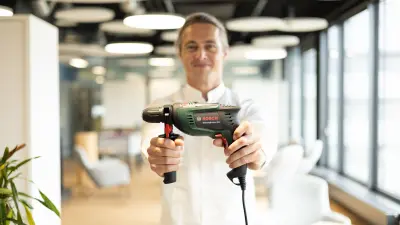From recycling center to tool shelf

Imagine a world where power tools get a second life instead of ending up in landfills. For a long time, this vision remained an ambitious goal. But at countless recycling centers, where decommissioned devices meet their end, lies an untapped resource: tons of high-quality plastic that, until now, has typically been incinerated rather than recycled and repurposed into new products. Bosch Power Tools has tackled this challenge as part of a pilot project, and with the limited-edition UniversalImpact 800 Closed Loop Edition impact drill, they're proving that a circular economy for power tools isn't just a dream – it's a tangible reality.
Hidden value: why raw materials must not turn to ash
In Germany, a power tool's journey typically ends at a recycling center. There, while metals are carefully recycled, other valuable raw materials often haven't found their way back into the material cycle. Plastics, in particular, are usually incinerated – a significant loss of material value and a missed opportunity to slash emissions. This is where the pilot project from Bosch Power Tools, in collaboration with external partners, came in: the mission was to close this loop by developing a special edition power tool with a housing* largely made from recycled engineering plastic sourced from retired devices. Engineering plastics are specialized plastics known for properties like exceptional durability and resistance. Stronger and longer-lasting than basic plastics, they're commonly found in machinery, vehicles, and electronic equipment.

78 % recycled engineering plastic
is contained in the product housing* of the UniversalImpact 800 Closed Loop Edition
The search for clues: data paves the way for recycling
The biggest challenge of the project was ensuring material quality. Power tools require plastics that can withstand both fluctuating thermal stresses and potential impact loads. Conventional recycled materials often cannot meet these requirements or are not available on the market in the required quality and color. The goal of the pilot project was therefore to produce a special edition of the UniversalImpact 800 impact drill, whose housing* consists of the largest possible proportion of recycled plastic from old devices, without compromising on appearance, feel, and the well-known Bosch quality.

Before new life could emerge from old housings, a lot of diligent work was initially required. A comprehensive feasibility study formed the foundation. Several thousand decommissioned devices were systematically collected and analyzed to determine the availability and quality of the plastics. Around 6,900 power tools ultimately formed the basis for a database. Each device was completely disassembled and recorded according to different criteria – from the type of tool to its weight and material composition. Over half a million data points were thus collected and evaluated. This scientifically sound analysis ensured that only suitable plastics were selected for the further recycling process.
-

Manual sorting of power tools to prepare them for the recycling process. -

Disassembly of devices in preparation for recycling. -

Careful sorting of individual components.
The transformation: from plastic fragment to high-quality recycled plastic

From the identified old devices, the glass fiber-reinforced plastics were sorted out – precisely those materials that are also used in conventional Bosch Power Tools. Now the recycling process for the special edition could begin: The old device housings were shredded into the smallest plastic particles, sorted by color, and meticulously cleaned. Through a special fusion process called compounding, the plastic particles were then processed into high-quality recycled plastic that met the strict quality standards of virgin material. In the final step, this recycled material could be processed into new product housings* on existing Bosch production lines without any modifications. In this way, around 6.5 tons of engineering plastic were recovered.
Around 6.5 tons of engineering plastic
were recovered as part of this project
The result: quality without compromises
The result of this pioneering work is the UniversalImpact 800 Closed Loop Edition. An impact drill that impresses not only with its performance but also with its origin. A total of around 10,000 units of this special edition were manufactured. The product housing* is made of 78 % recycled plastic, with the remaining proportions accounted for by components such as switches, drill chucks, and soft grips, as they consist of other types of plastic or other colors.
The UniversalImpact 800 Closed Loop Edition is a pioneering example of how a closed loop – from the return of decommissioned power tools to the process of recycling and the use of recyclated plastic in a new product – can be successfully implemented.

Summary
The UniversalImpact 800 Closed Loop Edition pilot project shows how high-quality products with full performance and quality can be developed from seemingly useless old devices. A first step to close the material loop.
* All externally visible components of the main product excluding cables and accessories.











